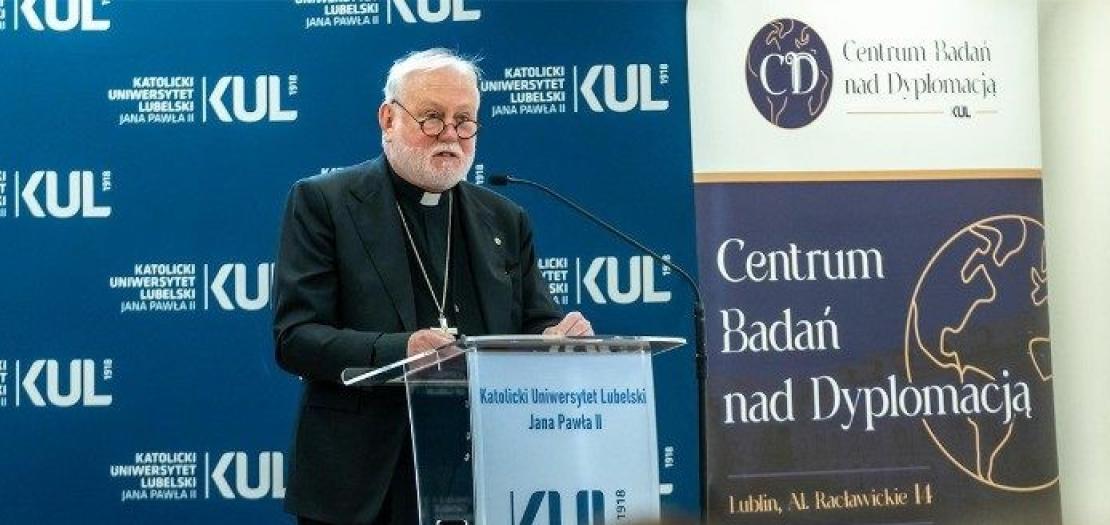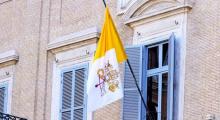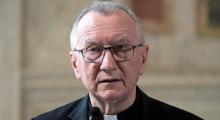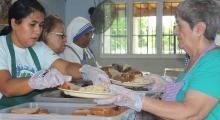Issued by the Catholic Center for Studies and Media - Jordan. Editor-in-chief Fr. Rif'at Bader - موقع أبونا abouna.org

The Holy See's commitment to resolving conflicts—whether in Ukraine, the Middle East, the Caucasus, Myanmar, Ethiopia, or Yemen—and promoting peace, advancing human rights and religious freedom, caring for our common home, opposing the "throwaway culture"; supporting migrants; and advocating healthcare access is unwavering. Furthermore, it champions just economic policies, fights human trafficking, and promotes fraternity and multilateralism. Described as a "field hospital amid a battle," the Holy See is a vital player in global conversations about the challenges facing the international community, exerting "soft power" that often secures results even major global powers struggle to achieve alone. Archbishop Paul Richard Gallagher, the Vatican's Secretary for Relations with States and International Organizations, described the vocation and tools of Vatican diplomacy, which currently maintains relations with 184 countries and is deeply engaged with global governance institutions. His presentation at the Catholic University of Lublin (KUL), titled "The Diplomacy of the Holy See in the contemporary world," was part of a conference organized by the University's Center for Diplomacy Studies.
Dialogue, humility, and peace-building
Gallagher outlined the current state of the Holy See's diplomatic mission, beginning with a historical perspective and emphasizing decades of bridge-building, dialogue, and the patient, humble approach that has proven effective in untangling seemingly insurmountable conflicts and fostering signs of goodwill among warring parties. In essence, this "diplomacy of mercy" embodies a genuine political commitment to solidarity and the common good—not as an abstract goal but through tangible actions like cancelling foreign debt, advancing cooperation and development policies, and promoting human dignity, even in the face of severe injustices such as the death penalty.
The Pope as the Chief Diplomat
To KUL students, Gallagher elaborated on the structures and key figures of Vatican diplomacy, such as Apostolic Nunciatures, the Pope's presence in diverse cultural and religious settings, and the role of Apostolic Delegates, who represent the Holy See locally where diplomatic relations have not been formalized. The Secretariat of State guides this "vast and well-defined" network, but, as Archbishop Gallagher explained, "the very first diplomat is the Pope himself."
The pontificate of John Paul II and "questions concerning Eastern Europe" amply demonstrated this, but even today, "we can see the impact that Pope Francis has on the international stage." To him, "the world turns," and "it is his words and actions that inspire and animate the diplomatic activity of the Holy See," the Vatican representative pointed out. Through exhortations, prayers, meetings, encyclicals, and journeys around the globe, "the Pope is tirelessly exercising his moral authority," confronting injustices, reaching the abandoned, and warning against harmful practices that jeopardize our world and future.
Efforts in Conflict Resolution
Gallagher's address also focused on the Vatican's quiet, behind-the-scenes efforts in conflict resolution, whether in Ukraine, the Middle East, Africa, or the Caucasus. Acting impartially, the Holy See "intervenes to support an idea of peace that is the f "uit of just relationships, respect for international norms, and the protection of fundamental human rights." The Holy See also works on humanitarian grounds to support the social renewal of often forgotten regions, facilitate family reunification for minors, and enable prisoner exchanges and the return of fallen soldiers between Russia and Ukraine. For the Holy See, "the principle of humanity" must never be "compromised in the name of military needs," mainly when civilian lives are at stake, noted the Archbishop. This commitment underpins its active engagement in disarmament discussions.
Right to Life
Gallagher also highlighted the Holy See's commitment to human rights, including "the right to life and the inviolability of every person as children of God" and the defense of "the sanctity of human life from conception to natural death" By defending "these rights, the Holy See upholds a moral "standard and sparks crucial global debates. He voiced concern over countries or coalitions imposing views on human rights and dignity that diverge from Church teachings, sometimes conditioning humanitarian and development aid on a country's willingness to adopt these ideologies. Gallagher also underscored the Vatican's "commitment to universal healthcare, albeit without embracing certain contentious" concepts that have evolved into a global ideological agenda, such as the so-called "right to abortion."
Religious freedom
Religious freedom was another central theme, with Gallagher reflecting on Pope John Paul II's legacy and reiterating the need to resist the instrumentalization of religion for political disputes, which has led to discrimination, violence, and even war. The Holy See consistently emphasizes "the public dimension of religious freedom while respecting the legitimate autonomy of the secularity of the State." It fosters a healthy dialogue between the state and religious communities as partners, not rivals.
Care for our common home, the throwaway culture, technology, and AI
Gallagher listed other crucial areas for Vatican diplomacy, including care for our common home, opposing the "throwaway culture" that devalues human dignity by assessing "people only by their utility, the impact of technological progress and globalization on the workforce, and concerns "about artificial intelligence's ethical implications. On migration, he reiterated the Holy See's commitment to pursuing solutions for a crisis affecting nearly 120 million people displaced by persecution, war, conflict, and poverty. He stressed the importance of just economic policies and efforts to "eradicate poverty, aiming to promote human fraternity as an antidote to the "globalization of indifference."
The "toxic scourge" of human trafficking
The Holy See is also deeply committed to eradicating human trafficking and other forms of modern slavery. "Pope Francis is universally recognized as one of the leading moral voices in the fight against human trafficking," Gallagher said, noting the Pope's ongoing calls for justice for people "deceived, assaulted, often sold many times for different purposes and, in the end, killed or, in any case, physically and mentally harmed." To combat this "toxic scourge," the Holy See urges governments to address the underlying causes, such as extreme poverty, corruption, injustice, and economic exclusion.
Being a sign of hope
In conclusion, Archbishop Gallagher emphasized that, against the backdrop of a world that the Pope has called "the third world war fought piecemeal," the Holy See's diplomatic mission remains unified in its commitment to "be a sign of hope." In this way, Vatican diplomacy "serves the common good" and acts as a voice affirming a shared yearning for stability, security, and peace.
Concordats and agreements
Gallagher also elaborated on the Holy See's bilateral diplomacy with various nations through concordats and agreements, which he described as "fundamental, on the one hand, to defend the locaSee'srches from any undue interference of the State in ecclesial matters, as well as, on the other hand, to engage with States on issues of common interest, in order to ensure effective cooperation within the social and religious spheres." He cited the Provisional Agreement with China on bishop appointments and similar arrangements with countries where formal diplomatic relations are still developing.
"Soft power"
Since becoming a permanent observer at the FAO in 1949, the Holy See has steadily intensified its engagement with the international community by contributing to numerous international organizations. This engagement allows the Holy See to "act primarily as a force of ethical leadership" with "independence from political alliances and blocs," fostering cooperation and dialogue. Thus, as Gallagher noted, the Holy See can serve as "a trustworthy mediator, which is paramount in addressing conflicts and fostering dialogue on global issues," building bridges where others may see only insurmountable divisions.







